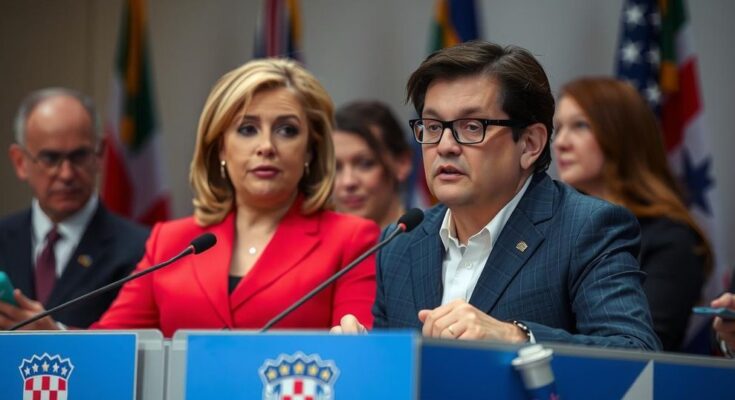Croatia’s President Zoran Milanovic will compete against Dragan Primorac in a run-off election after Milanovic secured 49.11 percent and Primorac 19.37 percent in the first round. The election highlights crucial issues of corruption, inflation, and political power balance in the nation.
In the upcoming election run-off, Zoran Milanovic, the current President of Croatia, will compete against conservative candidate Dragan Primorac. Milanovic, who garnered 49.11 percent of the vote in the initial round, fell short of the 50 percent needed to secure outright victory. Primorac, representing the ruling conservative HDZ party, received 19.37 percent of the vote, leading to the run-off scheduled in two weeks. Although Milanovic was anticipated to be the frontrunner, the results raised concerns for Prime Minister Andrej Plenkovic, whose party has governed Croatia since its independence in 1991. Croatia faces significant challenges such as inflation, corruption, and labor shortages, highlighting the context in which this election is taking place.
Croatia, an EU and NATO member with a population of 3.8 million, is navigating complex socio-economic issues, including high inflation and pervasive corruption. As the President holds considerable influence over the armed forces and foreign policy, this election is pivotal in maintaining the political balance against the longstanding dominance of the HDZ party. Milanovic, a former leftist prime minister known for his confrontational rhetoric, has positioned himself as a counterweight to the ruling establishment, which he criticizes for corruption. His campaign has centered on liberal values, while Primorac presents himself as a unifier focused on family and patriotism, thereby appealing to more conservative voters.
The impending run-off election between Zoran Milanovic and Dragan Primorac is poised to be a critical moment for Croatia’s political landscape, particularly given the incumbent’s challenge to the power of the ruling HDZ party. As both candidates embody divergent political ideologies, their respective campaigns will not only reflect their personal visions for Croatia but also determine the future control of key state institutions amid ongoing national struggles against inflation and corruption.
Original Source: www.kpvi.com




